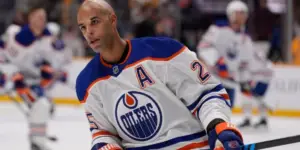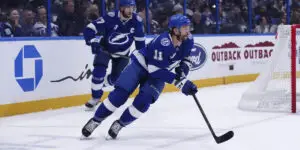
The Anaheim Ducks traveled to Chicago to take on the Blackhawks on Tuesday evening after losing in a shootout to the Stars in Dallas the night before. The Ducks came into this game 4-1-1 in their last six contests in a shocking mid-season turn of fortune for the club. On the other side, Chicago entered this game with a 7-3-0 record in their last ten games prior to their elongated all-star break. Both teams find themselves surprisingly hot heading into February but still remain two of the bottom three teams in the NHL standings.
Troy Terry was set to miss this game after leaving Tuesday’s game in the first period after taking a stick to his midsection. Ducks head coach Dallas Eakins said Troy would be day-to-day going forward. Derek Grant returned to the lineup for this game after missing the last two months with an upper-body injury. Brett Leason was also given the nod in the lineup after being a healthy scratch for the team’s last five contests. After putting on a show Monday night in Dallas, John Gibson was given the night off, and Anthony Stolarz got the crease for the first time since January 24th in a 5-2 win against the Arizona Coyotes. Petr Mrazek got the call to oppose him in net for the Blackhawks. The Ducks went into this game deploying a lineup that looked like this…
Recap
This game resembled a pillow fight between an easily stoppable force and an incredibly movable object. Some may be inclined to call it “low-event,” while others say “tight-checking.” The first period felt like one was watching a game between two bottom-feeding teams, one tired after a hard-fought game the night before, the other rusty after a long lay-off. So it went exactly how it was supposed to go. Neither team could establish a forecheck and pressure the opposing defense. They also had a tough time moving the puck through a clogged neutral zone. The period ended with a predictable 0-0 score.
The second period was a different story. It was like each team pressed the “forecheck button.” The game opened up when both the Hawks and Ducks forwards were more engaged lower in the offensive zones. Predictably, this caused defensemen to cough pucks up, and mistakes were capitalized on. Four goals were scored in the middle frame, each resulting from a heavy forecheck. It ended at 2-2.
The Ducks started to make increasingly more mistakes as the game wore on. In the third period, the Hawks could slice through the neutral zone with speed, which allowed them to generate more chances. Anthony Stolarz was able to keep the Ducks afloat and force an overtime frame. The Ducks would go on to win the game nearly halfway into the overtime frame and head home with two points.
Offense
Depth scoring has been hard to come by for the 2022-23 iteration of the Anaheim Ducks, so this game was a pleasant surprise. The team’s fourth line of Grant-Megna-Leason was relentless and disruptive for the entirety of the game. They were able to get in on the forecheck and disrupt Chicago’s breakout attempts seemingly at will. The first goal was scored when John Klingberg pinched from the point to keep a play alive by throwing a puck toward the net. Brett Leason found a loose puck, put it on the net, and followed his rebound to put it by Mrazek. Their second goal was caused by a turnover when Leason was hounding Chicago defenseman Seth Jones and causing him to lose the puck to Jayson Megna in the right circle. Megna buried his first goal for the Ducks in 25 games since being claimed off waivers. Both Leason and Megna would finish this game with a goal and an assist.
Trevor Zegras didn’t have a particularly impressive game in this one. He had improved so much on the defensive side of the puck this season but seemingly reverted to old habits this game. He was too eager to leave the defensive zone when pucks were moved up the boards to his wingers. If they couldn’t advance the puck, the Ducks’ defense would be outnumbered down low. His back-checking effort wasn’t where it needed to be or where it had been in the past. Chicago’s second goal directly resulted from his lack of effort in that department. Offensively, Zegras didn’t seem as sharp either until halfway through the contest. After that point, we saw the creativity and vision we’re used to from #11.
Defense
Over the last handful of games, the Ducks’ defensemen have been far more involved up ice. Whether on the forecheck deep in the offensive zone, closing in on outlets in the neutral zone, or joining a rush on a counter-attack, the defensemen are making an effort to impact the game higher up ice. As a group, they had a difficult time with puck-retrievals in this game. That could have been a side effect of getting caught up ice mixed with an aggressive Chicago forecheck. The defensive-zone coverage wasn’t as sharp as it had been before the All-Star break. They allow attackers to find soft spots and open spaces in dangerous areas. It’s far more reminiscent of their early-season struggles.
The Hawks’ first goal was scored after John Klingberg failed to get to his boards to keep the puck in the offensive zone. Adam Henrique was covering and retrieved the puck behind the Ducks’ goal line, moving it to Colton White. White was immediately pressured, lost the puck battle, and Patrick Kane was able to find Jason Dickinson streaking toward the net uncovered.
The second goal was scored off a broken face-off where the Ducks, as a whole, were caught too far up ice, and Chicago was able to recognize that and counter with numbers. Dmitry Kulikov was late to pressure the far-side winger, Henrique tried to cut off the passing lane and failed, and as mentioned before, Trevor Zegras was slow on the back-check. Credit goes to Seth Jones for recognizing the situation, joining the rush, and burying his opportunity.
Derek Grant returned to the penalty-killing unit and played alongside Jayson Megna. They killed the two chances they had and remained a major strength of the special teams of late. They have been aggressive on the puck carrier without sacrificing positioning elsewhere in the zone. They’ve also done an excellent job of keeping the net front clear so the goaltender can get a clean look at shots.
Goaltending
Anthony Stolarz showed no signs of rust in this game, as he stopped 27 of 29 shots. He didn’t stand a chance of saving either goal and had to make some tough saves down the stretch to keep the Ducks in this game. He was exceptionally proficient at tracking the puck laterally and moved fluidly from post-to-post a couple of times to make difficult saves look easy. He is sporting a .916 sv% over his last three games. It has been a solid turnaround for Stolarz since a tough start to the season.
Summary
It was nice to see the Ducks make the in-game adjustments they needed to win this game. They still have a lot of cleaning up to do in the defensive zone, but having the defensemen involved up-ice has led to some quality chances. To the dismay of many, this game will move them further away from the very bottom of the standings and the best odds of landing the #1 pick in the 2023 draft lottery. Next up on the schedule, the Ducks will head home to take on the Pittsburgh Penguins on Friday night. It will be Rickard Rakell’s first trip back to Honda Center as an opposing team member. We’ll see if the Ducks extend their point streak to six games.

Episode 133: Mama, Im Quacking Home – Late Arrivals: An Anaheim Ducks Podcast
Discover more from Inside The Rink
Subscribe to get the latest posts sent to your email.



